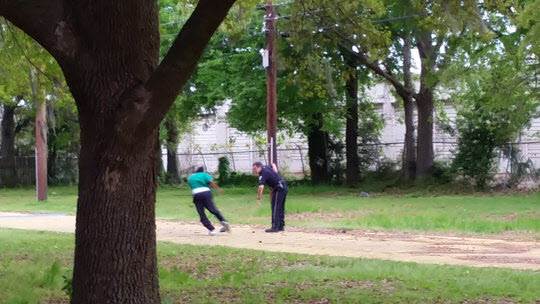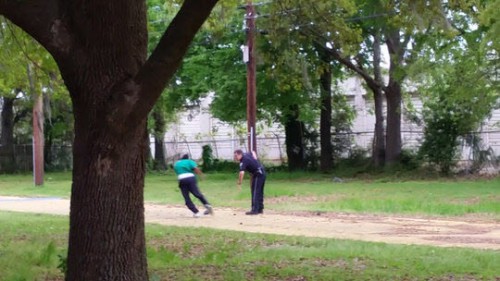

I have been watching some of the trials of officers accused criminally of killing unarmed black men (and armed ones that should have not have been killed either). I am increasingly convinced that using the criminal system is not going to be the answer for the widespread problem of officer-involved killings.
In some cases, prosecutors have clearly overreached in charging the cases criminally, rather than looking toward civil means to deal with the issue. However, I will say if there was ever a case for criminal charges it was the shooting death of Walter Scott by Officer Michael Slager.
This week, the Charleston jury deadlocked with the jurors split 11-1 for guilt, forcing a mistrial. I want to be clear, we have covered cases where a lone holdout has been a hero preventing a miscarriage of justice – at least three times in our years of coverage – but this is not one of those times.
In the now more than two years since Ferguson, the shooting of Walter Scott is the most clear-cut case for murder we have seen – and there are a number of shootings that are clearly unjustified.
The case happened on April 4, 2015, when then-Officer Slager pulled over Walter Scott in what was a routine traffic stop. There was a confrontation that was not caught on camera, Mr. Scott fled and Mr. Slager shot him five times in the back.
Mr. Slager then concocted his defense that they had a confrontation and Mr. Scott had grabbed a Taser and attempted to use it on the officer, forcing him to shoot and kill him. But unbeknownst to Officer Slager, a bystander filmed the encounter and caught Slager handcuffing Mr. Scott and moving the Taser that had fallen from his belt close to Scott’s hand.
The New York Daily News, in one of the more pointed editorials that came out this week, blasted the decision, “It is not the practice of this editorial page to assert the guilt or innocence of an individual accused of a crime. But the video evidence in this case was so compelling, so unequivocal, it demands departure from those norms.”
Why did a lone juror hold out? He bought into Mr. Slager’s testimony that he feared for his life. Slager testified to being gripped by a “total fear that Mr. Scott was coming toward me.”
But the problem with this is that being in fear for his life was not reasonable, given that Mr. Scott was retreating and unarmed.
As the Daily News put it, “While the legitimate anxieties of police officers who risk their lives daily are due respect, when measured against the incontrovertible video evidence, Slager’s fear can only be described as emanating from a parallel universe.”
The Daily News goes further, “Never again ought Americans scoff at Black Lives Matter protesters when they urge reforms in the wake of a wrenching string of caught-on-camera confrontations with police, often followed by tardy or callous pursuit of justice thereafter.”
The Atlantic asks the question, “What will it take to convict a police officer for shooting an unarmed man?” They ask, “How could the trial have ended in anything but a conviction?”
Conor Friedersdorf of the Atlantic writes, “In every instance where video was made public I watched it. I read about many killings, too. I never encountered a cop who behaved more egregiously than Slager. Nor was I alone in being horror-struck at his actions.”
“Officials in North Charleston have sought to calm tensions; offered condolences to the victim’s family; made no attempt to publicly defend the officer; and said they handed the investigation over to the state, though they were not obligated to do so, to ensure an impartial and independent inquiry,” the New York Times reported.
“I have watched the video, and I was sickened by what I saw,” North Charleston’s police chief told reporters.
To be clear, I fully support Mr. Slager being charged with murder. I believe that the officers in the Joseph Mann case in Sacramento should be charged with murder.
Criminally charging officers who cross the line, even if they are acquitted, is probably an incentive for police to change their conduct – because, let’s face it, no one wants to leave their fate in the hands of 12 unknown strangers.
But as the Walter Scott case now proves, no one wants to leave their community and their safety in the hands of 12 strangers either. We need to do more in the way of reforms.
Everyone wants to attack the Black Lives Matter movement, but do black lives matter? In what way does this verdict or non-verdict in this case demonstrate an affirmative answer?
So what is the answer?
The Michael Slager trial shows a prosecutor who did the right thing – he charged this case criminally. It also shows a police chief doing the right thing – turning the case over to the state to investigate and expressing outrage at what he saw on tape.
But, as we know too often, the police in grayer cases will stand by their men. Prosecutors are reluctant to try cases where they might not win.
I still think the answer is an independent police oversight system where officer-involved shootings are investigated by an independent prosecutor, where the remedies can be multi-faceted.
In extreme cases like Michael Slager, you have to prosecute the cases criminally. But many cases are really not criminal acts, but rather breaches of proper practices, and those officers need to have due process and then a system to remove them.
The response of police body-worn cameras is good – making sure those cameras are used is clearly a next step. But the final step is to change the rules for the use of force and how those breaches are investigated.
If we can’t get 12 people to agree on the guilt of Michael Slager, I don’t hold out much hope that the criminal charging route is going to be THE answer. Hopefully we can still create a combination of systemic changes to address these cases.
—David M. Greenwald reporting

OJ got off.
Having your fate as a criminal suspect determined by a consensus of twelve peers is imperfect, but the best system we can hope for. You need to do the trade-off analysis making a case that a system does not work and needs to be replaced. The tendency of a reactionary is to ping-pong back and forth in demanded system redesign “progress” that really only results in trading one set of problems for another.
From my perspective justice was not served in this case. But neither would it have been served with a lynching of the cop.
Lastly I would add that a form of justice has still been served in this case… even those like myself prone to come to the defense of cops have been impacted by this event in that I/we are more suspect of a population of truly bad people in law enforcement.
With all the trumped up false claims of an officer committing murder this is one of the few cases that the cop, Slager, deserves whatever he gets. It’s interesting though that the jury was far more unconvinced than just the one holdout.
“Montgomery, who is black, admitted he went into the proceedings expecting to vote for a conviction, but then changed his mind. “Due to the fact that what Michael Slager did wasn’t malicious,” he explained to Joy Behar. “It was not malicious, and I stand by that. It would be voluntary manslaughter, based on the law.”
“He went on to explain, “A lot changed. When the evidence was given to us in the court room, we couldn’t touch it. It wasn’t tangible. When we got back there and we were in deliberations, we able to look at forensic information. We were able to touch the taser. We were able to feel the gun.””
http://www.gossipcop.com/walter-scott-jury-foreman-the-view-video-michael-slager-case-interview-dorsey-montgomery-watch/
“Glued at the hip” — The major problem with these cases is that prosecutors are glued at the hip to law enforcement, as a former district attorney explained it to me. DA’s depend on law enforcement to say the right thing and make their cases.
Prosecuting one person in law enforcement is the same as attacking all of the brothers in law enforcement. Prosecutors don’t want to do that, don’t dare do that or they’re finished ever winning a criminal case again.
The system has not failed us. Yet. This was a hung jury, not an acquittal. Mr. Slager will be tried again. Let’s judge the system after this has concluded.
A novel idea.. might well work…